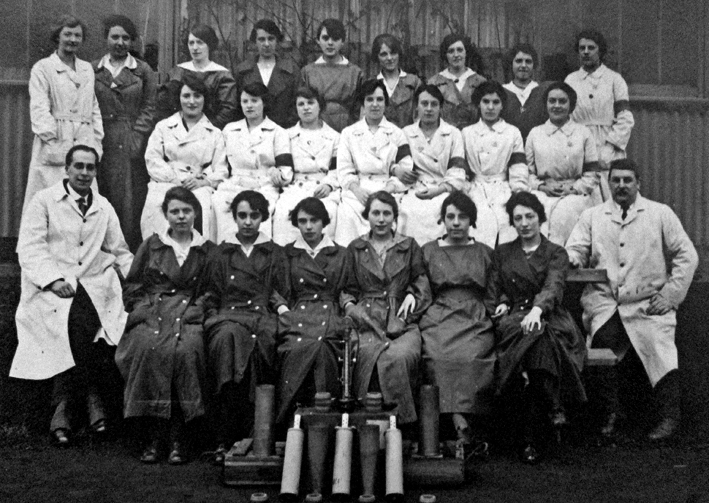
A tribute to the munitionettes involved in the production of weapons of war was written by J. W. Binstead and published in the N-T-F & Tuesday Telegraph of December 31st, 1918. It read:
From the day that Britain realised that British honour and prestige was gravely menaced by the Kaiser's legions and pestilential barbarism, the women of Great Britain can claim at least 50 per cent of the credit accruing to the armies of the victorious Allies during the last three years.
When the astute and wonderful Lloyd George set to work, shortly after hostilities broke out, to organise and mobilise workers for factories producing war materials under Government control, he surely must have had the womanhood of the country in his eye, otherwise the scheme could not possibly have been successful. For the heavy demand of the military (which required all men of military age to join the colours in practically any and all circumstances) would not allow these factories to be fully staffed by male labour.
However, a situation arose such as has never presented itself in history before. Women and girls were required – not thousands but tens of thousands, and they nobly and willingly stepped into the breach and did all – and more – than they were asked, to working alternate day and night shifts year in and year out.
They turned out shells, aeroplanes, guns and naval weapons of all descriptions at short notice, and in many cases under most unfavourable and distressing conditions, for it must be remembered that most of the work was carried out continually standing up and moving about. And many of these female Spartans were at times engaged in their strenuous and laborious occupations when they should have been in bed and under the care of a physician or a nurse, but their indomitable pluck and determination to 'stick it' was so strong that in many cases they 'stuck it' too long, with the results that the last flu epidemic claimed a large number of them.
A case in point has come under my own personal observation, although the lady in question has so far dodged the Grim Reaper. This splendid girl, a young and beautiful married woman, had been engaged on alternate day and night shifts at a shell fuse factory in this district for many months, and during that time had suffered illnesses in various forms which necessitated her making frequent calls on her doctor, who had practically ordered her to cease night work.
But she, like thousands of her sisters, thought that her absence from work might help to disorganise the great piece of war machinery and prolong the war. She ignored the physician's orders, with the result that one night a few months back she was found unconscious beside her work, and since then has been on a sick bed while her husband, poor chap, is at present in a military hospital, slowly recovering from severe wounds received in the last great 'Haig shove'.
However, this is only one case. There are thousands similar, some worse than others.
The point is: “Will these women - many of whom are married – and girls settle down in the everyday monotony and drudgery of domestic life?”
Personally, I doubt it. Not because the home will have lost its attraction and charm for many of them but because the talent and ability which was their during those strenuous days of war is now stifled, so to speak, and she finds herself back again performing duties which, though not exactly objectionable to her, do not permit of the same sense of knowledge that her national work imbued her with, and this, naturally, will tend to create a sense of dissatisfaction.
Surely the powers that be will not allow the memory of the great and noble part played by the 'Spartans of Great Britain' in this conflict to sink into complete oblivion altogether.
When the nation is dishing out its honours, individually and collectively, and perpetuating the memory of this and that and the other, let the work performed by the women of Britain be also suitably recognised by a national monument erected in one of the most conspicuous parts of London, which can be looked upon with pride in the years to come by the descendants of these splendid, plucky and patriotic munitionettes.

